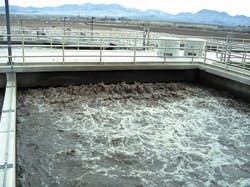Public-Private Partnership Saves Arizona City Nearly $150,000 per Year
| Related Searches from WaterInfoLink.com Public-Private Partnership | Arizona Department of Environmental Quality | Severn Trent Services | Safford, Arizona |
Earlier this year, the Safford, Ariz., city council asked Severn Trent Services , the company that had been operating its wastewater treatment facility for the previous six months, to report on their work.
What the Council and the city’s 9,000 residents received were 146,452 reasons why the public-private partnership had been a significant benefit to the southeastern Arizona city.
Jeremy Samuels, the Severn Trent Services on-site plant manager, reported that the company’s operation of the facility will save $146,452 during the first year of operation compared to the city running the system on its own. That’s approximately $12,200 in savings per month.
Dana Kaas, Severn Trent Services' vice president of operating services, noted that most small- to mid-sized municipalities don’t have the financial wherewithal or experience to match the resources of a company that specializes in water and wastewater management. “Municipalities in the United States have been outsourcing the operation of publicly owned wastewater facilities to private companies for more than 30 years,” Kaas said. “Today, it is estimated that between 2,400 and 2,600 publicly owned water and wastewater facilities are operated by private firms.”
During his presentation, Samuels went over the major objectives his company accomplished since it began running the facility. He said a number of improvements have been made, including the repair of malfunctioning equipment, the creation of a safer work environment and the streamlining of the plant to work as efficiently as possible. The company also made major cleanup and maintenance changes, keeping it compliant with the Arizona Department of Environmental Quality (ADEQ).
As part of their contractual agreement with the city, Severn Trent Services assumes all the plant’s liability issues. This includes the financial responsibility for paying fines if plant effluents do not meet ADEQ standards or if plant workers incur any injuries. There have been no fines levied to date.
The Safford wastewater treatment plant processes between 850,000 to 950,000 gal per day (gpd). Howe said the plant was designed to accommodate 2 million gpd and was engineered with the ability to double its capacity with minimal plant upgrades. He said that by having a private company operate the plant, the city will be able to increase the plant’s wastewater processing capability without any plant upgrades or additions.
“With the addition of Severn Trent Service’s operational expertise, we should be able to get another 500,000, 600,000, 700,000 gal out of the plant to increase the capacity without any new investment,” Howe said.
“Cities and industrial clients rely on private partners to protect their utility investment and ensure regulatory compliance,” Kass said. “Our professional operations personnel help improve process control while reducing administrative and operational costs. Our brief tenure at Safford demonstrates public-private partnerships do work.”
